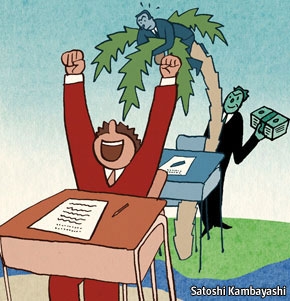Another example is Trendyol, a Turkish “flash sale” site that mimics Vente-privee.com and Gilt Groupe, which popularised the idea of time-limited online sales of designer clothing. But Trendyol, whose backers include Kleiner Perkins Caufield & Byers, also sells its own mass-market clothing line, with seasonal designs “crowdsourced” from users in Turkey.
另一個案例是土耳其的“限時搶購”網(wǎng)Trendyol,此網(wǎng)站模仿的是Vente-privee.com和吉爾特集團(Gilt Groupe),正是這兩家公司令在線限時搶購品牌時裝的概念流行起來的。KPCB風投公司是Trendyol的投資者之一。但Trendyol也擁有自己的暢銷服裝系列,每季都從土耳其用戶處“眾包”款式。
There are different ways to play the copycat game. Rocket Internet, started by the Samwer brothers—Alexander, Marc and Oliver—in Germany, is a cloning “factory” that copies American and European businesses, hiring entrepreneurs to run them and exporting these start-ups to emerging markets as fast as possible so they are the first entrants. More traditional venture capitalists are setting up offices and selectively backing local entrepreneurs. American venture investors often prefer to bring in a local partner to provide more consistent mentorship to these entrepreneurs and give advice on how to navigate the domestic market.
而模仿商業(yè)模式的方法也各不相同。由桑威爾(Samwer)三兄弟——亞歷山大(Alexander),馬克(Marc)和奧利佛(Oliver)——在德國創(chuàng)立的火箭網(wǎng)(Rocket Internet)是一家模仿歐美商業(yè)模式的時裝“工廠”,網(wǎng)站雇用企業(yè)家負責經(jīng)營并將這些新興企業(yè)以最快的速度輸出到新興市場,以成為第一批進入者。更多傳統(tǒng)的風投公司正在成立事務(wù)所并對新興市場的本土企業(yè)家進行選擇性投資。而美國的風投公司往往喜歡找一個本土合作伙伴對這些企業(yè)家進行更為一致的指導(dǎo),并就如何駕馭該國的國內(nèi)市場提供建議。
Such advice can be valuable, given the specific risks of setting up in emerging markets. First, companies can take longer to get off their feet, given grinding local bureaucracy. “An eight-year fund might not be sufficient in Brazil,” says José Luiz Osorio of Jardim Botanico, a Brazilian seed investor. Second, there are cultural barriers: it can be hard to recruit employees to work for an unknown company in exchange for equity, for instance. Third, exiting through large initial public offerings is unlikely in countries like Turkey and Brazil, where IPO activity is muted and investors like to buy well-known firms; that means venture firms are reliant on strategic buyers to gobble up their creations.
鑒于投資新興市場有特定風險,這些建議也會有價值。首先,因為當?shù)毓倭胖髁x之風甚濃,公司要花更多時間才能發(fā)展起來。“在巴西交八年的錢可能都不夠”,巴西種子投資機構(gòu)“植物園”的José Luiz Osorio說道。其次是文化上的隔閡:例如,招募員工為一家不知名的公司打工并以公司股份作為報酬,這可能很困難。第三,在土耳其、巴西這些國家,沒什么公司會在那里進行首次上市而且投資者喜歡購買知名公司的股票,所以風投公司不可能通過大型的初次上市活動抽身而退;這意味著風投公司得指望目光長遠者購買其創(chuàng)立的公司。

Tropicalisation piles on an additional set of risks. Copycats can easily lose share when the original company eventually enters the local market. Sonico, once the Facebook of Latin America, got “pummelled” when Facebook arrived, says Nenad Marovac of DN Capital, which was behind Sonico. And even if they can see off competition, the copycats are unlikely to be mega-blockbusters because, by definition, they are not new. “With innovation you have a global upside, but with copycat innovation you have geographical limits,” says Eric Archer of Monashees Capital, a Brazilian venture firm.
熱帶化還會帶來額外的巨大風險。當原創(chuàng)公司最終要進入當?shù)厥袌鰰r,模仿者可能會很容易便失去原有市場份額。曾是拉丁美洲的臉譜網(wǎng)的Sonico在臉譜網(wǎng)打入拉丁美洲時被“扁”了一頓, Sonico投資者DN資本(DN Capital)的Nenad Marovac說道。而且即使這些模仿者能在競爭中獲勝,它們也不太可能成為雄霸市場的超級巨頭,因為嚴格來講它們的商業(yè)模式并不新。“有所創(chuàng)新就能在全球范圍內(nèi)擁有優(yōu)勢,但模仿別人的創(chuàng)新卻有地理局限性,”巴西風投公司Monashees Capital的埃里克 阿徹(Eric Archer)說道。
It will not be long before emerging markets spawn their own innovations that can be trotted out on a global scale. That would be closer to the spirit of venture capital, which is supposed to ferret out and fund new ideas, not imitations. Until then, however, tropicalisation is set to become an ever more popular strategy. Copy that.
很快,新興市場就會出現(xiàn)大量在全球范圍內(nèi)適用的創(chuàng)新商業(yè)模式。那將更切合風投的要義——搜尋新點子并進行投資,而非投資模仿者。但在那之前,熱帶化定會成為一個越來越普遍的策略。模仿吧!
來源:可可英語 http://www.ccdyzl.cn/hangye/201206/186814.shtml












